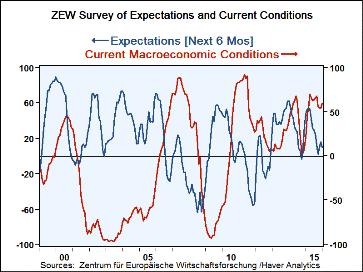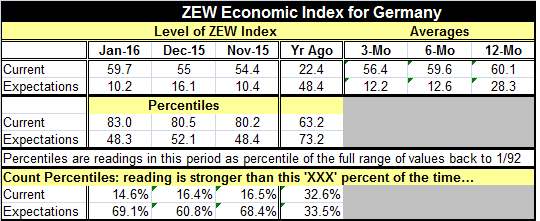 Global| Jan 19 2016
Global| Jan 19 2016ZEW Expectations Tick to Lowest Standing Since October
Summary
ZEW expectations continue to cling to weak values. In January the expectation reading fell to 10.2 from 16.1 in December, below November's 10.4 reading and to its weakest reading since October. The ZEW current reading picked up in [...]
 ZEW expectations continue to cling to weak values. In January the expectation reading fell to 10.2 from 16.1 in December, below November's 10.4 reading and to its weakest reading since October. The ZEW current reading picked up in January to 59.7 from 55 in December to its strongest reading since September.
ZEW expectations continue to cling to weak values. In January the expectation reading fell to 10.2 from 16.1 in December, below November's 10.4 reading and to its weakest reading since October. The ZEW current reading picked up in January to 59.7 from 55 in December to its strongest reading since September.
The current reading is still quite strong as historically it has been stronger only 14% of the time. Expectations, however, are much less ebullient as they are well below their midpoint and have been higher fully 69% of the time. Year-on-year current conditions in Germany are sharply higher and expectations are sharply lower.
What we hear a lot about from Germany is news of disturbances created by migrants. German society has been unsettled by this growing mass of foreigners. However, we do not see evidence of their impact in economic numbers or we don't see it yet.
Still, a number of reports suggest that the migrant issue has become a real problem. Some reports have hold that police departments have been told not to file reports and instead to cover up the extent of the disturbances. With Germany having balanced its budget, it may be seeking new tax schemes to finance the cost of migrant welfare. The ZEW report is one made by financial experts who assess the German economy. The Ifo report comes next. It is a report from people in various industries and with their feet on the ground. ZEW usually anticipates the Ifo result fairly well, but if something is stirring, the Ifo should pick it up.
In January the ZEW experts raised their profit expectations for stocks to a 7.1 reading from 6.6 in December. It is the highest assessment since January 2011. The assessment on bonds fell to -5.8 in January form -5.2 in December. It ties the weak reading of September 2015 and is the weakest bond reading since August 2015.
The ECB continues with its stepped up stimulus program. But markets in Europe have been in chaos in the New Year as the fallout from China has spread. The new take on China is that bad news has become good news as weakness in China will lead to more stimulus and that will be good. Last year China did expand at its weakest pace in 25 years and growth came in a tick below its target. Will stimulus work? Maybe. China is a communist country and it has no illusions about leaning too hard on monetary policy. China in fact has used a lot of fiscal measures and as a result its firms have huge debt problems. China may engage in more stimulus, but it has problems everywhere including a huge debt overhang. Meanwhile, in Europe, the low grade bond market is in shambles. Europe remains challenged in its own right, let alone the possibility of knock-on effects from China.
The ZEW report from Germany tells us that everything in the hermetically sealed German economy is doing quite well. The weak euro affords the highly competitive German economy a nice cushion in which to operate. Economic conditions infrequently have been better. But Germany faces another kind of threat. And the much lower reading on its expectations measure gives voice to that concern.

Robert Brusca
AuthorMore in Author Profile »Robert A. Brusca is Chief Economist of Fact and Opinion Economics, a consulting firm he founded in Manhattan. He has been an economist on Wall Street for over 25 years. He has visited central banking and large institutional clients in over 30 countries in his career as an economist. Mr. Brusca was a Divisional Research Chief at the Federal Reserve Bank of NY (Chief of the International Financial markets Division), a Fed Watcher at Irving Trust and Chief Economist at Nikko Securities International. He is widely quoted and appears in various media. Mr. Brusca holds an MA and Ph.D. in economics from Michigan State University and a BA in Economics from the University of Michigan. His research pursues his strong interests in non aligned policy economics as well as international economics. FAO Economics’ research targets investors to assist them in making better investment decisions in stocks, bonds and in a variety of international assets. The company does not manage money and has no conflicts in giving economic advice.
More Economy in Brief
 Global| Feb 05 2026
Global| Feb 05 2026Charts of the Week: Balanced Policy, Resilient Data and AI Narratives
by:Andrew Cates






